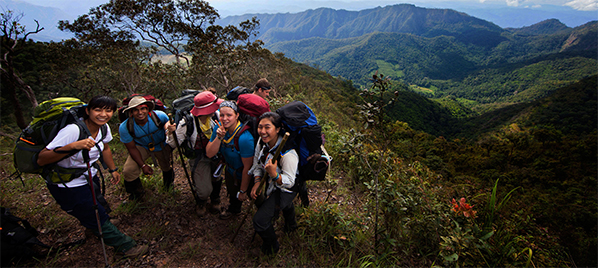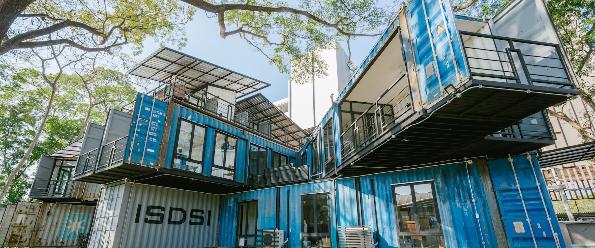

Sustainable Development Studies: Thailand
Semester Program in Chiang Mai, Thailand with ISDSI
Journey into the forests, mountains, and islands of Thailand to study the links between culture and ecology, and how local communities are creating a sustainable future.
This study abroad semester is like no other, with our unique Expedition Field Course format allowing students to travel and study throughout Thailand, from remote hill tribe villages in the North to the islands in the South.
Expedition Field Courses are hands-on learning — assignments include everything from coral reef surveys to ethnographic research. Students live with local families, and backpack, sea kayak and travel through the landscapes they are studying.
OVERVIEW
The culturally and ecologically rich country of Thailand is the ideal setting in which to study how people interact with an array of ecosystems within the context of sustainable development. From our institute in the vibrant northern Thai city of Chiang Mai, students travel throughout Thailand to learn about issues in sustainability directly from the people being impacted by and in turn impacting the ecosystems on which they depend.
Our program is designed around our
Expedition Field Courses that enable students to spend as much time as possible in the field, interacting with and learning directly from the subjects they are studying. Every course is interdisciplinary and highly experiential and provides an incredibly immersive learning experience.
Program Highlights:
- Immersive Learning
- Home Stays
- Wilderness Travel Skills including backpacking, snorkeling, and sea kayaking
- Leadership and Risk Management training
- Thai language study
- Main academic courses taught in English
- Backpacking and sea kayaking between remote villages
- Study of both ethnic Thai majority society and several ethnic minority cultures
- Meetings and discussions with leaders from villages, government institutions, and NGOs
- Ecology field research
- Optional Intership Placements following the semester
COURSES:
THAI FOUNDATIONS-- Thai Language, History, and Culture
Small group language classes (3-5 students). No English is used in the classroom, and students will learn to speak, read, and write in Thai. Each morning during Foundations students are in the classroom studying Thai, with experiential learning opportunities each week. Language instruction continues throughout the semester when students are at the institute, and Thai is used during each Expedition Field Course. Depending on the policies of the home institution, Thai may be used to meet language requirements depending on the level of proficiency achieved. A series of seminars on Thai history, culture and society take place throughout the course, with extensive guest speakers and visits to local Non-Governmental Organizations (NGOs). By the end of the course students will have the background to understand the key sustainability issues and development challenges in Thailand.
SUSTAINABLE FOOD SYSTEMS-- Sociology, Biology
This course examines in depth both the context and practice of agroecology and sustainable agriculture. These issues form the core of sustainability, and include such topics as ecology and natural resource management, food supply, and the role of biological and sociological systems in global sustainability. Seminars and discussions take place “in context” to the learning— i.e. reading about agroforestry, then going into an agroforest to study the plants growing there. This is—literally—a “hands on” course. Students will get muddy tramping through the fields, blisters from working on the farm, and tired from hiking up into remote villages.
POLITICAL ECOLOGY OF FORESTS-- Anthropology, Ecology
This course explores the ethno-ecological relationship between humans and forests. Most of the course will be conducted within villages in the extreme northwest corner of Thailand, nestled among mountains that have long since been the domain of Karen ethnic people. Tropical forest ecology, the Karen adaptation to this environment, and the conflicts over forest resource management form the thematic backbone of the course. By living, farming, interacting, and traveling through the forests with villagers, students will learn firsthand how the Karen livelihood is intertwined with their forest world.
CULTURE AND ECOLOGY OF THE ANDAMAN-- Sociology, Ecology
This course focuses on the coastal communities and islands of the Andaman Sea, Southern Thailand. This course examines two ecologically important areas — the coast of Trang and the Adang Archipelago — focusing on reef ecosystems, mangroves, seagrasses, and the human communities that depend on them for their survival. Both the physical and cultural environments are challenging—over a week of travel will be by sea kayak, and half of the course will be in a small Southern Thai fishing village. By the end of the course, students will have an understanding of the major issues surrounding coastal ecology and culture, with experience in and understanding of coral reefs, mangroves, sea grasses and tidal areas; as well as understand the unique challenges and struggles of the human communities that live in the coastal zone — the semi-nomadic Urak Lawoi and Southern Thai Muslim fisherfolk. These cases represent a complex situation of multiple and often conflicting resource uses in the coastal ecosystem and rapidly changing ways of life for the coastal and island people.
For more information and for details on applying, please visit
www.isdsi.org

